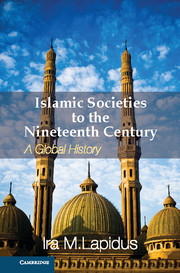Book contents
- Frontmatter
- Contents
- List of Illustrations
- List of Figures
- List of Maps
- List of Tables
- Preface
- Acknowledgments
- Acknowledgments to the first edition of A History of Islamic Societies
- Acknowledgments to the second edition of A History of Islamic Societies
- Publisher's Preface
- Introduction to Islamic Societies
- Part I The Beginnings of Islamic Civilizations
- The Middle East from c. 600 TO c. 1000
- The Preaching of Islam
- The Arab-Muslim Imperium (632–945)
- Cosmopolitan Islam: The Islam of The Imperial Elite
- Urban Islam: The Islam of Scholars and Holy Men
- Women, Families, and Communities
- Chapter 17 Muslim Urban Societies to the Tenth Century
- Chapter 18 The non-Muslim Minorities
- Chapter 19 Continuity and Change in the Historic Cultures of the Middle East
- Part II From Islamic Community to Islamic Society
- Part III The Global Expansion of Islam from the Seventh to the Nineteenth Centuries
- Glossary
- Bibliography
- Annotated Bibliography from A History of Islamic Societies, 2nd Edition
- Index
Chapter 18 - The non-Muslim Minorities
Published online by Cambridge University Press: 05 February 2013
- Frontmatter
- Contents
- List of Illustrations
- List of Figures
- List of Maps
- List of Tables
- Preface
- Acknowledgments
- Acknowledgments to the first edition of A History of Islamic Societies
- Acknowledgments to the second edition of A History of Islamic Societies
- Publisher's Preface
- Introduction to Islamic Societies
- Part I The Beginnings of Islamic Civilizations
- The Middle East from c. 600 TO c. 1000
- The Preaching of Islam
- The Arab-Muslim Imperium (632–945)
- Cosmopolitan Islam: The Islam of The Imperial Elite
- Urban Islam: The Islam of Scholars and Holy Men
- Women, Families, and Communities
- Chapter 17 Muslim Urban Societies to the Tenth Century
- Chapter 18 The non-Muslim Minorities
- Chapter 19 Continuity and Change in the Historic Cultures of the Middle East
- Part II From Islamic Community to Islamic Society
- Part III The Global Expansion of Islam from the Seventh to the Nineteenth Centuries
- Glossary
- Bibliography
- Annotated Bibliography from A History of Islamic Societies, 2nd Edition
- Index
Summary
The situation of religious minorities – Jews, Christians, Zoroastrians, and others – under Muslim rule or in Muslim-majority societies is highly controversial. Some contemporary scholars see them as an assimilated and integral part of the Middle Eastern (or Muslim) world. Others see them as ethnic enclaves. Still others see them as persecuted minorities.
In Muslim domains, non-Muslims had a legally and culturally legitimate standing. Non-Muslims were entitled to the practice of their religion, to autonomy in internal communal matters, to commercial activity, and to political safety or protection in return for the payment of a special tax and acceptance of Muslim rule and social supremacy. Although non-Muslims bore significant legal and social disabilities and often suffered the disdain of Muslims, in general, the security and prosperity of the religious minorities was assured in ʿAbbasid Iraq, Fatimid Egypt, Umayyad Spain, and the Ottoman Empire. In politically and economically troubled times, there were periods of exploitation, harassment, and persecution.
Although Jews, Christians, and others had a separate religio-communal identity, they were integrated into Middle Eastern societies in language, trade, and scholarship, and sometimes in government. Non-Muslims were participants in a shared nonreligious high culture of science and philosophy, theology and poetry, and many aspects of folk culture, such as norms of daily living in eating, dressing, social behavior, and commerce that were much the same regardless of religious affiliation. Even religious beliefs were similar. Whatever their religion, most peoples believed in the existence of God, the creation of the world ex nihilo, the last judgment, eternal life, prophecy, and the efficacy of the veneration of saint’s tombs and other holy places. The cultural, religious, and social customs of non-Muslims were shaped by their interactions with the dominant societies, but they also contributed to forming Muslim beliefs and lifestyles.
- Type
- Chapter
- Information
- Islamic Societies to the Nineteenth CenturyA Global History, pp. 193 - 210Publisher: Cambridge University PressPrint publication year: 2012



